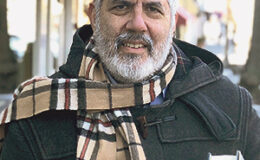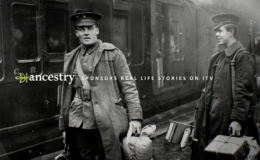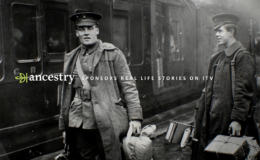
Advertisement
Nonfiction
In their memoirs, Carmen Rita Wong and Chrysta Bilton open up about how they learned of secrets, lies and unkept promises.

By Gabrielle Glaser
WHY DIDN’T YOU TELL ME? by Carmen Rita Wong
NORMAL FAMILY: On Truth, Love, and How I Met My 35 Siblings, by Chrysta Bilton
A few years ago, a friend of mine sent a vial of his saliva to a DNA testing company hoping to gain clues about his late father’s Italian ancestry. The results were a shock. He had no Italian blood at all. The man who’d raised him from infancy, and whose name he carried, was not his biological father. After weeks of checking his results against those of cousins with whom he shared no DNA, he mustered the courage to ask his nonagenarian mother about the findings. “So I had an affair!” she said. “Whoever thought there’d be 23andMe, for chrissakes.”
Tens of millions of Americans have taken DNA tests, and stories of them linking up with unknown family, often separated by closed adoptions, have been a feature of news reports for years. Some, like my friend, learn of “misattributed parenting,” or what is known as an NPE, for Non-Paternity Event. Scores of others have found out that they were conceived through sperm or egg donation (or both) — and that they have rafts of half siblings. For decades in America, the law, branches of medicine and parents found ways to justify withholding origin stories from adoptees, donor-conceived people and those with misattributed parenting.
Podcasts, documentaries and now two new memoirs underscore the need for people to learn the truths about their biological families.
In “Why Didn’t You Tell Me?” the former CNBC host Carmen Rita Wong gives a riveting account of an early-1970s childhood that was molded by the cultures of her separated immigrant parents. As a toddler, she lived with her mother Lupe’s extended Dominican family in Harlem, while her Chinese father, Peter Wong, took her and her older brother to Chinatown for memorably elaborate meals. Before Wong started elementary school, Lupe married an Italian American man, Marty, and moved the family to New Hampshire.
There, Wong struggled to make her way in a bleached and predictable suburban world. Hardworking, withholding Lupe — who swiftly gives birth to four more daughters — wore an apron every night to make dinner, and Marty returned home from work carrying a briefcase and wearing a trench coat. Mainstream American culture presented this world as ideal. But to Wong, this prettily packaged image felt like a prison — and the gulf between it and the rich, gritty world of Manhattan was vast. Plantains and hanging roasted duck gave way to runny eggs with ketchup and microwaved bologna. The relief offered by a down-the-hall neighbor after a family spat was replaced with chilly New England solitude. The din of Chinese fish markets and subway station steel drums was supplanted by a new background noise: racist spite that poured out of teachers, neighbors and police officers.
Wong developed nimble survival strategies, weaving Lupe’s determination with Peter’s hustle and Marty’s financial know-how. She didn’t dare keep a diary, lest her prying, suspicious mother discover her thoughts (among other things). That Lupe did not grant her daughter privacy is perhaps no wonder: She herself harbored one secret after another — especially about her firstborn daughter. But when Lupe was dying of cancer, Marty revealed information that set Wong on her heels. It uprooted her identity once more — and not for the final time, either. Years later, a DNA test revealed the full truth.
The subjects of “Why Didn’t You Tell Me?” are weighty, ranging from Wong’s (justifiable) rage at her mother’s narcissism to her crushing grief after the loss of a sibling. But she tells her story in vivid conversational prose that will make readers feel they’re listening to a master storyteller on a long car trip. She describes water pumped from an upstate stream that “tasted like the cleanest ice.” On a trip to Chile, she encounters a carved table so colossal, all the diners looked like children in grown-up chairs. Ultimately, Wong triumphs. After a painful divorce, she powers her way through a graduate degree at Columbia to a successful career as a media entrepreneur, and then to a cherished role as a sister, aunt and mother. Hers is a hero’s journey.
In “Normal Family: On Truth, Love, and How I Met My 35 Siblings,” the first-time memoirist Chrysta Bilton recounts a dramatically different family revelation from DNA testing. The book takes time to find its footing. It begins with a forgiving portrait of Bilton’s mother, Debra, as she ricochets through get-rich-quick schemes and struggles with addiction. Debra was brought up in Beverly Hills as the daughter of a prominent judge and, as we are reminded repeatedly, the granddaughter of a California governor.
Although Bilton says the book is based in part on written records, conversations and photographs, some aspects of Debra’s story seem implausible. Debra catalogs a long list of celebrity lovers and claims her rebuff of a sexual advance by Mick Jagger inspired one of rock’s most famous lyrics, a fact unconfirmed by music historians.
Bilton says she checked the facts of her memoir “where I could.” Yet she makes some basic errors. In describing Debra’s young adulthood from 1967 to 1983, she writes: “The Summer of Love, which she could have been the poster child for, had faded over the past decade and a half and been replaced by skyscrapers, Wall Street and the beginnings of the Cold War, special thanks to Ronald Reagan.” The Cold War, of course, began in the late 1940s.
Debra was clearly ahead of her time. A single gay woman, she decided to create her own family in 1983, offering $2,000 to a handsome, athletic stranger she met at a beauty salon to be her sperm donor. A musician, Jeffrey Harrison described an impressive family tree that he falsely claimed included, as a great-uncle, the Supreme Court justice Oliver Wendell Holmes. (Bilton misses a chance to note Holmes’s relevance to a tragic chapter of American reproductive history. He wrote the infamous 1927 Supreme Court decision authorizing compulsory sterilization with the words: “Three generations of imbeciles are enough.”)
These oversights are regrettable, because when Bilton writes about her own experiences, away from the shadow of her mercurial mother, she shines a much-needed light on the impact of the secretive, unregulated world of sperm donations.
Harrison told Debra that he wouldn’t share his sperm with anyone else. But he soon learned of the high demand for an attractive man’s genes in the growing field of assisted reproduction. While artificial insemination had been around since the 19th century, by the early 1980s the development of in vitro fertilization had expanded the possibilities for people hoping to conceive children. He became a regular — Donor 150 — at one of the nation’s first sperm banks, making up to $400 a month for weed, gas and rent for eight years.
Bilton was 23 when Debra learned from a New York Times article that Harrison was the biological father to a number of other children, many of whom had met through a donor sibling registry. By then, Bilton had grappled with problem drinking, an abusive boyfriend and an eating disorder. Over the next few years, there would be more coverage of Donor 150 and his many offspring. The siblings formed a Facebook group, which, thanks to DNA testing, grew to include many dozens.
Throughout her unstable childhood, Bilton had longed for a traditional upbringing. After graduating from Barnard and moving to Florence for art school, she married and had two sons, eventually accepting the realities of her own deeply complex and thoroughly modern family.
Hovering over both books is the centuries-old question popularized by Francis Galton: Which matters more — nature or nurture? Wong asks what it means to lose one strand of your biography. Bilton is forced to revise hers when she learns she shares her troubled father with dozens of others.
Both Wong and Bilton were lied to, in the biggest possible ways. Wong holds those responsible for her plight — her mother and a sexist society — to account. Bilton feels betrayed by her mother’s half-truths and her father’s broken promise, but stops short of examining the highly profitable, largely unregulated fertility industry that allowed a single man to father at least 35 siblings — including a half brother she dated before discovering the reason people said they looked like siblings.
It would have been useful to note that partly because of such potential horrors, many other countries have regulations on the trade of sperm. But the United States has hardly any. Colorado is trying to bridge that gap. Recently, it became the first state to give donor-conceived people the right to learn their donor’s identity when they turn 18, and to obtain the donor’s medical history before that. Among other provisions, the law, which takes effect in 2025, also limits the number of families who can use a specific donor.
These restrictions are a useful first step. As Wong’s and Bilton’s deeply human narratives so aptly convey, no one should ever be in the dark about his or her own origins.
Gabrielle Glaser is the author of “American Baby.”
WHY DIDN’T YOU TELL ME? by Carmen Rita Wong | 240 pp. | Crown | $28
NORMAL FAMILY: On Truth, Love, and How I Met My 35 Siblings, by Chrysta Bilton | 288 pp. | Little, Brown & Company | $29














